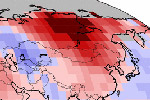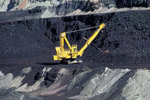Could 2014 be a turning point for efforts to slash global greenhouse gas emissions? Maybe: in less than 24 hours the world’s two largest emitters of carbon dioxide announced plans to finally rein-in the gas most responsible for global warming.
Yesterday, the Obama Administration announced long-awaited rules by the Environmental Protection Agency (EPA) that would cut carbon dioxide emissions from power plants by 30 percent by 2030, based on 2005 levels. Less than 24 hours later, China announced it would set an absolute cap on its own CO2 emissions, which are the largest in the world, by 2016.
The new EPA rules, which were rolled out to much fanfare yesterday, allow each of America’s 50 states to choose the best way to tackle their own emissions, while setting distinct targets for each state. But cumulatively, this would amount to cutting CO2 emissions by nearly a third from 2005 levels. Environmentalists largely applauded the new rules.
Former Vice President, Al Gore, called the move “the most important step taken to combat the climate crisis in our country’s history,” adding, “We simply cannot continue to use the atmosphere as an open sewer for dirty and dangerous global warming pollution that endangers our health and makes storms, floods, mudslides and droughts much more dangerous and threatening–not only in the future, but here and now.”
However, some argued the president wasn’t going far enough.

Coal mine in Wyoming. Burning coal is the most carbon-intensive energy source. Photo by: the U.S. Bureau of Land Management.
“President Obama’s draft power plant plan should be strengthened to achieve the global pollution cuts scientists recommend,” said Kevin Bundy with the Center for Biological Diversity’s Climate Law Institute. “He also has to quit stalling on reducing emissions from other sectors such as air travel and the oil and gas industry. If we keep kicking the can down the road, the cost and difficulty of averting catastrophe will skyrocket.”
While the U.S. target represents a significant cut from 2005 levels, it’s a much smaller cut when looking at 1990 levels: just under eight percent. Most international negotiations have used 1990 as the benchmark year for greenhouse gas emissions.
Despite its shortcomings, the announcement by the EPA are the first time in the country’s history to regulate carbon dioxide emissions from its largest source, power plants. Moreover, experts say the new target could help push global negotiations on climate change forward.
This appeared to come true less than a day later with China’s announcement. Although sparse in details, China has affirmed for the first time that it will set a total cap on its own carbon emissions. The country says it doesn’t expect its emissions to peak until 2030, but setting a cap in the next two years will allow the international community to gauge the level of China’s commitment on combatting global warming.
“The key point will be where (the cap) is set,” a spokesman for EU Climate Action Commissioner Connie Hedegaard told Reuters. “If ambitious and announced well in advance of Paris, it could be a game changer.”
The world’s governments have pledged to come up with a new climate agreement at a summit in Paris in 2015.
Related articles
Upcoming EPA Proposal could put America back on track to lead on global warming

(05/27/2014) A regulation proposal on coal plants that the U.S. Environmental Protection Agency (EPA) will release in June could be great news for the climate change initiative. The EPA rolled out tough regulations on new constructions of electric generation facilities in January, but the nation’s 1,500 existing power plants were left unaffected.
April ties for warmest on record

(05/27/2014) Globally, this April was a scorcher, tying with 2010 for the warmest April on record, according to new data released by the National Oceanic and Atmospheric Administration (NOAA) last week. This makes 2014, to date, the sixth warmest year on record going back to 1880 when comparing the first four months.
Extreme cold and drought in U.S. linked to climate change

(05/23/2014) The U.S. Midwest and Northeast experienced one of the coldest, snowiest winters on record this past season. This might seem contrary to warming trends forecast by climate scientists, but a new analysis released today in Science points out that climate change caused by greenhouse gas emissions may actually have contributed to the well-below average temperatures seen in parts of the U.S.
Climate change’s ominous secret

(05/21/2014) Climate change is happening and humans are causing it, primarily from the increase in atmospheric carbon dioxide caused by burning fossil fuels. This much we know. The ‘secret’ comes from changes happening in the fast-warming Arctic: we may be surprisingly close to an Earth that supports far fewer humans than it does today.
Tipping point already reached? West Antarctica in slow-motion, unstoppable melt

(05/14/2014) Two hundred years from now, the planet could look very different. This week two landmark studies revealed that West Antarctica’s ice sheet is in a state of seemingly inevitable collapse linked to climate change. The slow-motion collapse would by itself eventually lead to a rise in global levels of 3.6-4.5 meters (12-15 feet).
Featured video: John Oliver skewers media ‘balance’ on climate science in viral video
(05/13/2014) Sometimes you need comedians to tell the truth. On his new show, Last Week Tonight, comedian John Oliver took on the poor state of media reporting on climate science.
Underwater horrors: shells of marine life melting off the coast of the U.S.

(05/08/2014) It could be the plot of a horror movie: humans wake up one day to discover that chemical changes in the atmosphere are dissolving away parts of their bodies. But for small marine life known as sea butterflies, or pteropods, this is what’s happening off the West Cost of the U.S. Increased carbon in the ocean is melting away shells of sea butterflies.
Stanford kicks coal out of its $18 billion endowment

(05/07/2014) The fossil fuel divestment campaign won a major victory today as Stanford University announced it would drop coal companies from its massive $18.7 billion endowment, the fourth largest of any American university. The action follows a petition by student group Fossil Free Stanford and five months of research by Stanford’s Advisory Panel on Investment Responsibility and Licensing.
Cosmos’s Neil deGrasse Tyson on climate change: ‘What’s our excuse?’

(05/06/2014) America’s favorite astrophysicist, Neil deGrasse Tyson, tackled climate change on the most recent episode of the hit show, Cosmos: A Spacetime Odyssey. The episode, the ninth in the series, looked back on the climatic and physical upheavals undergone by Earth, before highlighting the mild interglacial climate that allowed the human species to kickstart the neolithic revolution and the first civilizations.